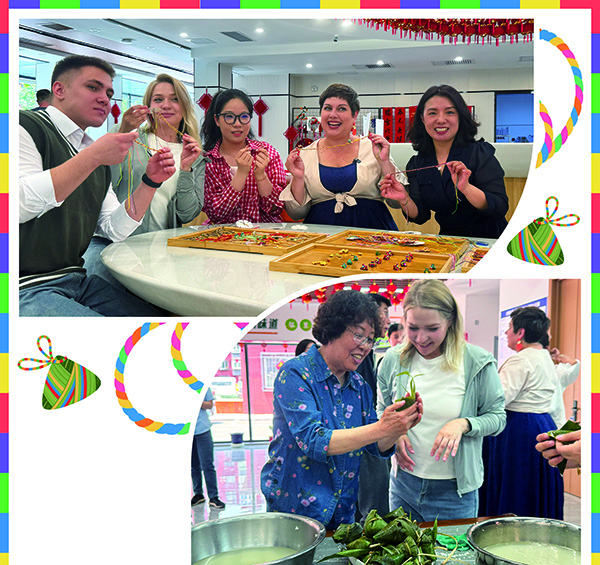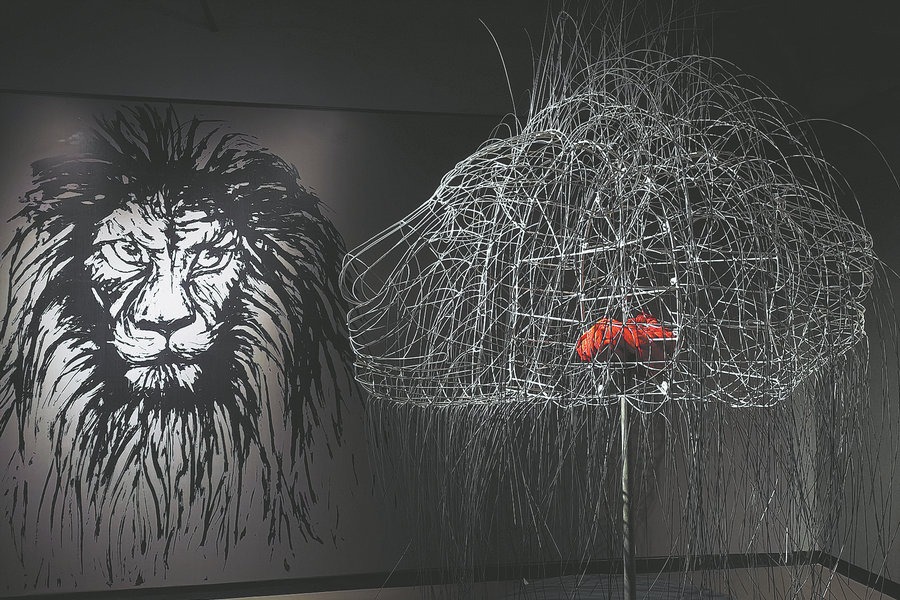When tradition meets curiosity


At a neighborhood event in Shenyang, generations come together as locals guide international students through the hands-on joys of an age-old festival.
"Making zongzi isn't just about skill — it's about inheritance. One generation teaches the next, and that's how traditions live on," said a local resident as she guided Russian student Rodionova Aleksandra during a cultural event at the Chang'an Community Center in Shenyang, Liaoning.
Held on May 29 in the lead-up to the Dragon Boat Festival, the event welcomed international participants, including Aleksandra and her fellow student Baranov Nikita from the Shenyang Institute of Technology.
Together with local residents, they took part in traditional activities such as preparing festive foods, weaving decorative cords, and touring a newly revitalized neighborhood center.
Inside the community dining hall, Aleksandra tried her hand at wrapping zongzi — glutinous rice dumplings wrapped in bamboo leaves — a signature dish of the festival.
As she struggled to fold the leaves into the proper cone shape, Cao Xue, the community Party secretary, gently said: "Take your time — you can't rush zongzi."
"The bottom must be sealed tightly, or the rice will leak out," she explained. "And the string has to go around three times: once to shape it, once to hold it together, and once to tie the knot."
Aleksandra compared the process to making pirozhki, a Russian meat-filled pastry. "We use dough to wrap the filling, which is simple. But with bamboo leaves, the folding has to be precise — there's no room for mistakes," she said.
"Zongzi-making is a craft," Cao added. "I've been doing it for 30 years."
Nikita also gave it a try, but his zongzi unraveled just as he thought he was done. "This is even harder than learning Chinese," he joked.
"You'll get the hang of it after a few tries," a nearby resident reassured him. "When we were children learning from our grandmothers, we also spent a whole morning just to make one that looked halfway decent."
At another booth, participants learned how to weave colorful cords — a traditional accessory believed to ward off evil and disasters during the Dragon Boat Festival.
"In Russia, young people also make bracelets, usually as a symbol of friendship. Friends give them to each other to express mutual affection," said Nikita. "But your weaving technique requires much more finger coordination than ours."
He added that while Russian friendship bracelets mainly symbolize affection, they aren't tied to any particular ritual, but the colorful cords of the Dragon Boat Festival carry a deeper cultural significance.
Community volunteer Wang Mei guided the students through the weaving process while explaining its meaning.
"According to Shenyang tradition, these cords should be worn until the first rainy day after the festival. Then, they're thrown into puddles to wash away misfortune," she said.
Aleksandra was intrigued by the custom. "In Russia, we also have traditions to ward off bad luck — like sprinkling salt at the doorway or burning incense to cleanse a room," she said. "The practices may differ, but they all reflect a shared hope for peace and protection."
After completing their cords, the participants also learned from Wang how to make fragrant sachets filled with mugwort and mint, traditionally used to repel insects.
"Young people today don't know much about these old customs," said an elderly resident nearby, watching the group with curiosity. "It's heartwarming to see international friends taking such an interest in our traditions."
Neighborhood revival
After the activities, the students visited the community's recently renovated cultural center — a space that was once an abandoned boiler room.
According to Wang Linxiang, Party secretary of Shenyang's Dadong district, the modern facility — spanning about 3,000 square meters — is purposefully designed, incorporating areas for elderly care services, children's play, and a community dining hall.
"It's now a multifunctional hub for all ages," he said.
He explained that the Chang'an community, built in the 1980s, had long struggled with outdated infrastructure and a lack of proper facilities. In 2023, local authorities began a major renovation effort, resurfacing roads and adding sports areas, smart security systems, senior-friendly benches, charging stations, and more.
"Seeing how a boiler room became a vibrant community center really shows the power of local initiative," said Aleksandra.
"Renovation isn't just about new buildings — it's about creating shared spaces where different generations and cultures can connect."
During lunch, locals and students sat together to enjoy freshly made zongzi and traditional dishes. The residents explained how people in Northeast China like to eat zongzi — by dipping them in white sugar.
Nikita took a bite of a sweet zongzi and smiled, "The texture is quite special — chewier than our buckwheat porridge — and the sweetness is very subtle."
"The feeling of sharing food is really the same everywhere," he added. "Though the flavors are different, sitting together and introducing each other to our hometown dishes — this warm atmosphere is exactly like our Russian family dinners."
As the event concluded, the students reflected on what the day meant to them. "What impressed me most was how traditions are kept alive through practice, not just preservation," Nikita said. "We didn't just learn about the Dragon Boat Festival — we lived it."
Before leaving the community, they packed up their handmade zongzi and colorful decorative cords, eager to share the experience with their classmates. "Reading about Chinese culture in textbooks is one thing — experiencing it with real families is something completely different," said Aleksandra.
"Cultural exchange works best when it happens naturally — when people share what they love with curious visitors, who become part of the community, even just for a day," said Nikita.
Liu Shicheng contributed to this story.




































